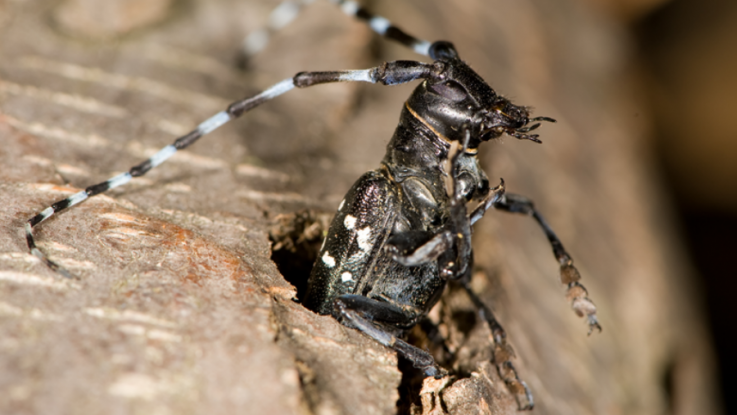
What is the Asian Longhorned Beetle?
The Asian longhorned beetle is an invasive species of beetle that has been destroying ecosystems across North America for multiple decades. FMCA is here to share info on why this species is dangerous and how you can help stop the spread.

Don’t Move Firewood
If you have stayed in a campground or RV park in your life, you have likely seen the signs warning you to not bring in firewood from out of state. “Buy it where you burn it,” “Don’t move firewood,” or “Burn local” are all common phrases used to spread the message. You may have thought that it was just their way of getting you to purchase firewood from the camp store, but the motives are actually much purer than that! The future of local ecosystems was in mind when this rule was created.
The Hitchhiker You Never Invited
Imagine, you are cutting up some fresh wood to chock your RV tires and take with you on the road and to the campground. When you arrive at your campsite, Asian longhorned beetles emerge from the wood you have brought, and they start attacking the nearest maple trees. It might seem a bit extreme, but you likely will not even be aware of this happening, and it can have catastrophic effects on the local area. This is the beginning of an infestation that could decimate our nation’s maple trees and many of the industries that rely on North American hardwoods.

The pest that is on everyone’s radar these days is the Asian longhorned beetle (Anoplophora glabripennis or ALB), a native of Asia that likely came to the United States inside pallets and wood packing material sometime in the 1980s.
ALB was most recently found in South Carolina this past June, and now shares the dubious distinction of joining Massachusetts, New York, and Ohio in the fight to eradicate ALB. Working closely with our partners, USDA has successfully eradicated ALB infestations in the Chicago area of Illinois, and the northeastern area of New Jersey. And we continue to work tirelessly to eliminate this pest from the other states. But we need everyone’s help.
What Can I Do?
It might seem obvious, but the answer really is simple – We need to keep ALB from hitchhiking on cut wood, such as wood chocks and firewood, which means leaving the wood where you first found it. If it’s at your home, leave it at home. If you go to East Fork State Park, near Cincinnati, for instance, buy your wood there. And, once at your destination, leave any unburnt wood there. (East Fork State Park is within the ALB quarantined area for the ALB infestation in Tate Township, so wood cannot be taken out of the park regardless.)
While it can cost a little, usually very little, to purchase wood or cut wood where your destination is, the consequence of moving wood from other locations to new locations will cost more to us all if a new infestation is started. And, taking wood out of any ALB quarantined area can mean a fine greater than buying wood onsite, which defeats the purpose of bringing your own firewood anyway!
It can be cost-effective to collect wood from the area surrounding your campsite, but some RV parks do not allow this, so make sure you are following the campground’s rules, if this is what you choose to do.
This practice of purchasing or collecting firewood from the area where you are staying is also great because you do not need to worry about filling a storage area with firewood. This adds weight to your cargo and causes splinters and small pieces of bark to cover the inside of your storage bays.
Additional Resources
For more information about the Asian longhorned beetle and other ways to keep it from spreading, visit www.AsianLonghornedBeetle.com. For local inquiries or to speak to your State Plant Health Director, call 1-866-702-9938.
By Steve Talley, Plant Health Safeguarding Specialist
USDA’s Asian Longhorned Beetle Cooperative Eradication Program, Ohio


Leave a Reply